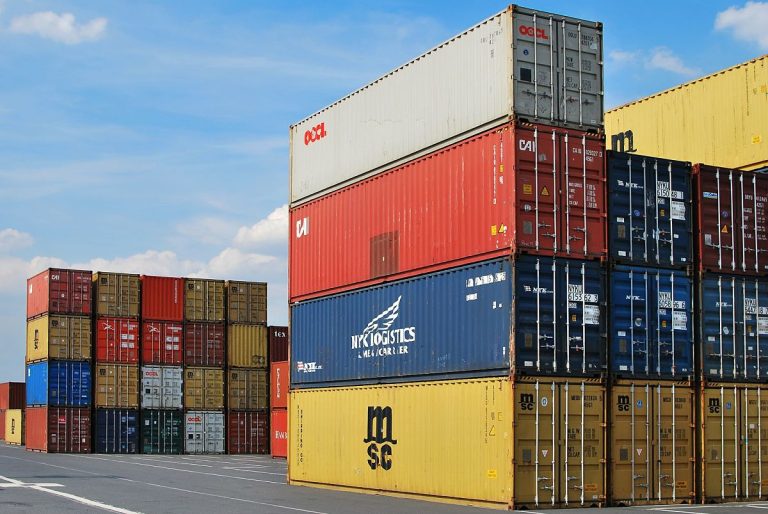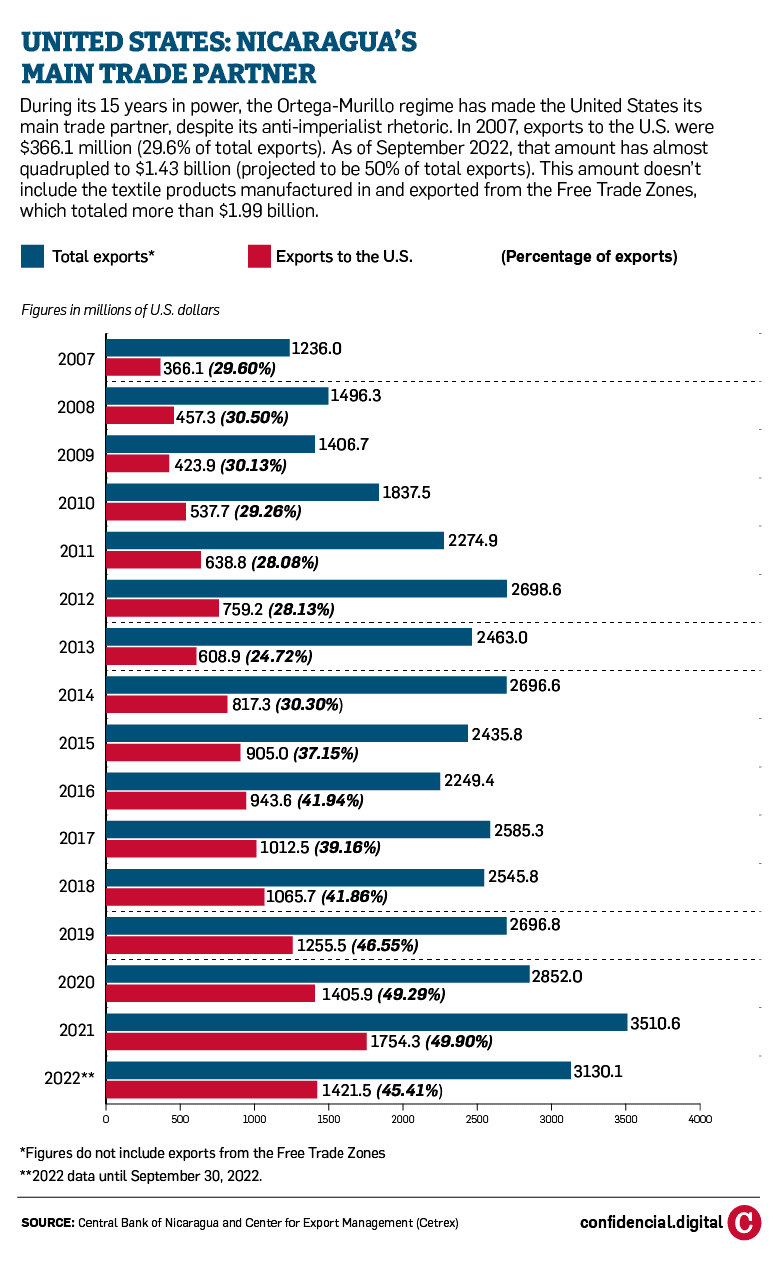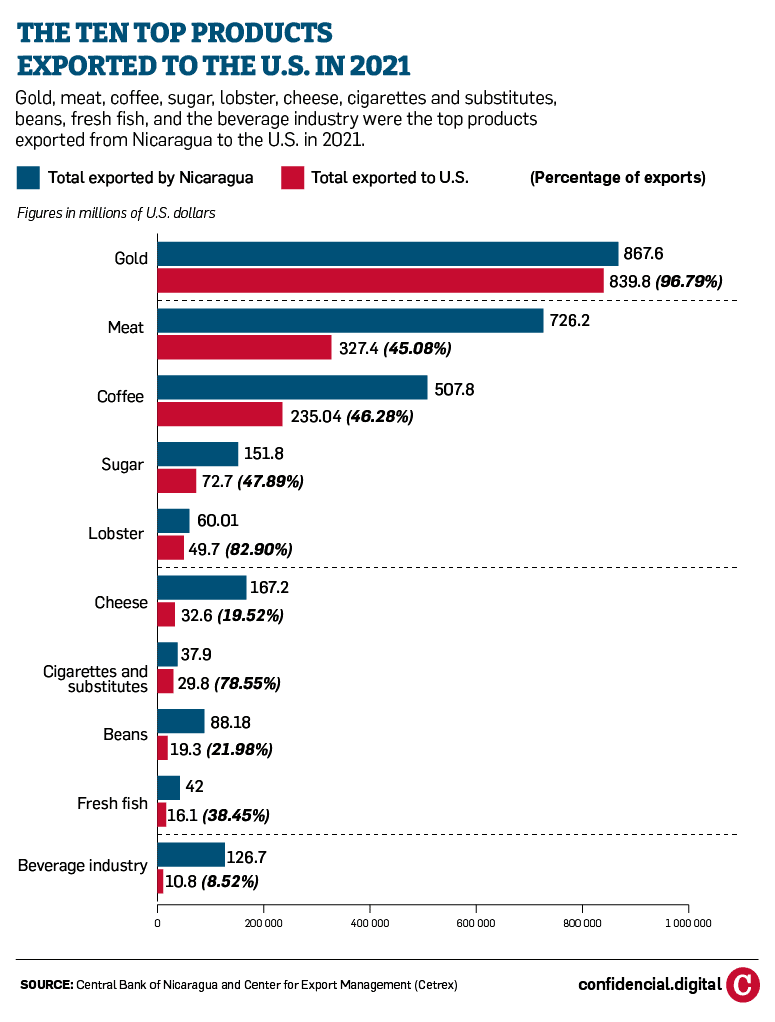2 de noviembre 2022

Children of Exile: The Births “Sowing Hope” in the Camp of Nicaraguan Farmers

PUBLICIDAD 1M
PUBLICIDAD 4D
PUBLICIDAD 5D
Nicaragua has almost quadrupled its exports to the U.S. during the last 15 years of the Sandinista government

Entre enero y agosto
In his diatribes against imperialism and the United States, Nicaraguan dictator Daniel Ortega hides an important detail: the U.S. has been, during his last 15 years in office, the main destination of Nicaraguan exports.
When Ortega returned to power in 2007, Nicaragua exported some US$ 366.1 million to the United States, a figure that --as of September of this year-- has almost quadrupled to $1.42 billion, according to data from the Export Processing Center (Cetrex).
These numbers do not include exports from the free trade zones. Theses exports enjoy greater tax and customs incentives under the Free Trade Agreement between the United States, Central America and the Dominican Republic (CAFTA-DR).
In 2007, sales to the United States represented 29.6% of total Nicaraguan exports. As of last September, they reached 45.4%. No other country exceeds a double-digit percentage. Only El Salvador comes close, with 9.5%.
As of September 30, 2022, Nicaragua's total exports reached $3.13 billion, according to official statistics.
Countries such as Venezuela, Russia or China --political allies of the Ortega-Murillo regime-- are not among the top ten destinations for Nicaraguan exports. According to Cetrex data as of September, none of the three exceeds 1% of total exports.
Nicaragua has exported approximately $20.5 million to Venezuela, mainly pharmaceuticals and vaccines. China has purchased some US$11.2 million in goods, mostly mineral products. Around $1.9 million worth of exports, mainly coffee, have been shipped to Russia.

The U.S. government has reminded the Ortega dictatorship of the importance of the bilateral relationship between the two countries. At the beginning of February, the U.S. Embassy in Nicaragua began a series of publications on its social networks about the U.S.’ economic contribution.
"The United States remains Nicaragua's largest trading partner, with nearly $5 billion in bilateral trade between January and July 2022 alone. The U.S. represents more than 60% of Nicaragua's exports (including the free trade zone) and 35% of its imports," stated a tweet published in mid-October.
Another post noted that "the U.S. is the main market for Nicaraguan beef." According to the embassy publication, Nicaraguan beef exports to the U.S. "reached a record $361 million in 2021, supporting the sustainability of 650,000 jobs and more than 100,000 cattle ranchers".
They noted that in 2021, Nicaragua was the United States’ sixth largest meat supplier. The Nicaraguan meat industry surpassed countries such as Uruguay, Argentina, Japan and Costa Rica, and was only below Canada, Mexico, Australia, New Zealand and Brazil, according to a publication this past April.
The U.S. embassy has emphasized that Nicaragua imports from the United States some 68% of the oil and petroleum products it consumes, which "constitutes an indispensable source of energy to boost the local economy and sustain millions of jobs".
In a June publication, the U.S. embassy noted that "the United States imports more than 90% of all textiles produced in Nicaragua. These textiles, produced in the free trade zones, represent the largest export sector in terms of value (more than $2 billion) and generate 75,000 jobs."
The information was accompanied by two graphs. One indicated that in 2006, Nicaragua exported $879 million in textile products to the U.S., a sector that in 2021 reached $1.996 billion in sales.
According to these figures, during the last fifteen years of the Ortega government, textile exports increased 127%.
The other graph showed how Nicaraguan textile exports were distributed globally: $1.996 billion dollars to the United States, $60 million to Mexico, and $53 million to Canada.
The U.S. statistics do not coincide with "preliminary" data from the Central Bank of Nicaragua (BCN) which indicate that in 2021, only $1.815 billion in free trade zone textile products were exported, although they do show the United States as the main destination, with more than 80%.

According to official figures, in 2021, Nicaragua exported some $3.378 billion in free trade zone products, mainly textiles and wiring harnesses for automobiles.
Ovidio Reyes, president of the BCN, said that free trade zone exports will reach US$3.5 billion by the end of 2022.
Blanca Callejas, president of the Association of Producers and Exporters of Nicaragua (Apen), said at an event that "between the traditional sector and the production of free trade zone exports," Nicaragua will, in 2022, exceed $7 billion in exports for the first time.
The growth of free trade zone textile exports is comparable only to the sharp increase in gold sales to the United States, which reached $620.2 million as of August.
"The United States imports almost 80% of the gold produced in Nicaragua. Gold is one of Nicaragua’s main export products in terms of value --totaling $942 million in 2021-- and revenues from gold exports have grown more than 150% since 2017," according to a publication by the U.S. Embassy in Nicaragua in May.
According to official statistics, in 2007, Nicaragua exported $61.4 million in gold; by September of this year, gold exports had reached $708.7 million. This represents a 1,000% increase over 15 years.
Sales through September represent an 8.6% increase over the same period in 2021. If that growth rate is maintained, the sector will close the year with revenues of $955.9 million, very close to the $1 billion the industry has projected it will generate in 2023.
Last week, U.S. President Joe Biden modified an executive order and authorized sanctions on the General Directorate of Mines (DGM), attached to the Ministry of Energy and Mines (MEM), which is intended to "complicate" Nicaraguan gold exports to the United States, according to Ricardo Zúñiga, Assistant Secretary of State Department for Latin America.
"We are talking about gold today, but this new authorization of the executive order allows us to analyze other sectors of Nicaragua's economy as well," warned Zúñiga.
This article was originally published in Spanish in Confidencial and translated by our staff.
PUBLICIDAD 3M
Confidencial es un diario digital nicaragüense, de formato multimedia, fundado por Carlos F. Chamorro en junio de 1996. Inició como un semanario impreso y hoy es un medio de referencia regional con información, análisis, entrevistas, perfiles, reportajes e investigaciones sobre Nicaragua, informando desde el exilio por la persecución política de la dictadura de Daniel Ortega y Rosario Murillo.
PUBLICIDAD 3D